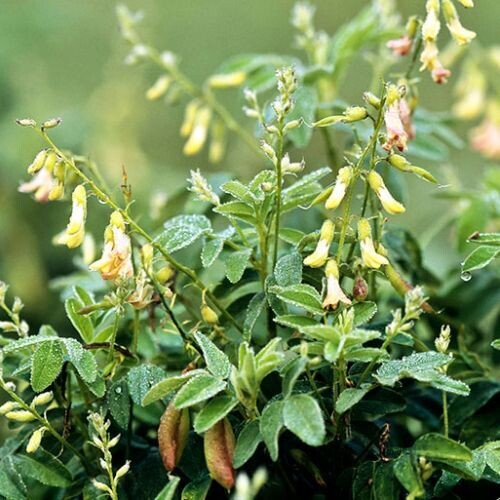ASTRAGALUS (Astragalus membranaceus)
Available either as a dried herb or herbal tincture.
Note: This a nutritional, functional food supplement and not veterinary medicine. For more information, refer to Dr Kellon's Horse Sense - Nutrition is not 'Alternative' Therapy .
Tincture
Our human-grade, certified organic tinctures give you a ready-to-absorb potent source of phytonutrients at the highest-strength available, for immediate absorption straight into the bloodstream and to the body’s cells.
- 100% certified organic pure tincture
Astragalus membranaceus Root, Decocted 1:3 35% , Organically cultivated
- Feed Guide
- 6ml/100kg bodyweight, daily in feed.
- Always shake the bottle to disperse any sediment.
- 3-year shelf-life.
Dried Herb
- Certified organic dried root
Astragalus membranaceus, Cut Root , Organically cultivated, Origin China
- Feed Guide
- 5g/100kg bodyweight per day, thus for an average 500kg horse add 25g daily to feed.
- 1-year shelf-life.
Functional Nutritional Value
Constituents: Flavonoids, triterpene saponins, polysaccharides, amino acids, essential fatty acids, phytosterols, volatile oils, and trace minerals.
NB. Our range of botanicals are all grown, harvested and dried without the use of agri-chemicals, non-irradiated and GMO free - see our Quality page for Quality Management & Certification Documents. Laboratory tested for identification and compliance to the British and European Pharmacopoeia standards, and are human grade.
Please be aware that if you're purchasing our dried botanicals for human use, our dried range is cut to appropriate sizes for feeding to horses.
More ...
Astragalus is a primary - and effective - immunity herb; traditional Chinese medicine think so too, having used it for at least 2,000 years. It was originally recorded in the Shennong Ben Cao Jing ( The Divine Farmer’s Materia Medica - one of the first books on Chinese medicine), and considered one of the 50 fundamental herbs of TCM practice. They consider it an important tonic herb for maintaining vitality ( qi ), the internal energy that protects against imbalances caused by harmful external influences ( wei qi) , and strengthening immunity resistance, being extensively used for colds, flus, and shortness of breath. As a general qi tonic, TCM also value astragalus as a restorative for reducing fatigue.
It's very edible as well with a sweet taste - it's extensively used in broths, soups, decoctions and infusions, and is commonly added when cooking rice, but tends to be removed before serving as it's a bit too fibrous to chew.
Astragalus is a renowned immunomodulator, balancing the response of the immune system by either increasing or decreasing its activity as needed for a particular situation, and promoting long-term strengthening of the immune system, protecting against infection. Herbalist Guido Masé suggests taking astragalus regularly in the autumn and winter to strengthen immunity and keep colds, flu, and bronchitis at bay. It's also said to be useful for bolstering against allergies as well as for general states of autoimmune hyperreactivity.
Like ashwagandha, astragalus is a renowned adaptogen, increasing the body’s ability to resist and cope with stress (whether physical, mental, or emotional), helping us adapt to the stressor instead of succumbing to it. As a nourishing tonic, astragalus is immune building as well as immune restorative, and useful for rebuilding the immune system after an illness or long-term stress, helping those in weak, depleted states regain strength and vitality. It's said to be particularly beneficial for PTSD.
It's also valued for its hepatoprotective effect, which means it protects the liver against toxic substances and viruses and supports liver health.
We blend it into our both our CushTonics , our EyeTonic , our Immunity CARE range (exc. LymeCARE - see Safety below), and our BreathePlus.
Safety
- Astragalus may be incompatible with immunosuppressive drugs (Hoffmann, 2003.
- Astragalus is contraindicated with late-stage Lyme disease as it may exacerbate the autoimmune response (Buhner, 2013), hence why we don't include it in our LymeCARE programme.





